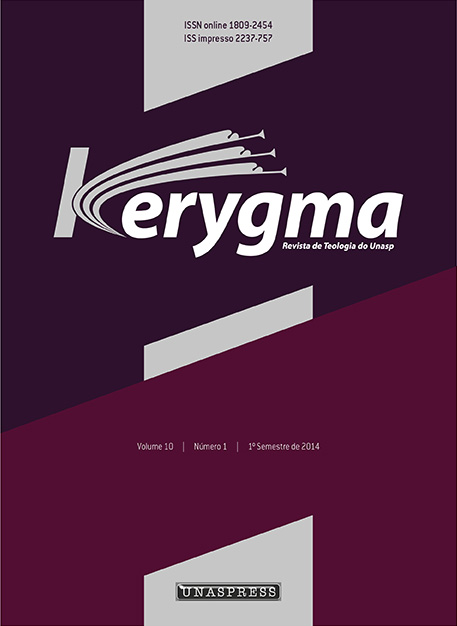IS PLATINGA'S ARGUMENT FOR GOD INCOMPATIBLE WITH HUMAN FREE WILL?
Keywords:
Alvin Plantinga, Argumento ontológico modal, Argumento do livre-arbítrio, Wes Morrison.Abstract
Wes Morriston escreveu alguns artigos afirmando a incompatibilidade do Argumento Ontológico Modal de Alvin Plantinga e o Argumento do Livre Arbítrio contra o problema do mal. De acordo com ele, o Argumento Ontológico Modal defende um Deus essencialmente bom e livre em oposição ao Argumento do Livre Arbítrio, que defende que o melhor tipo de liberdade é a liberdade significativa, justificando a pessoa de Deus ao nos criar com tal liberdade. Nesse trabalho tentaremos resumir os argumentos e a posição de Morriston. Concluindo, veremos que há razões para concordar com ambos os argumentos de Plantinga sem entrar em contradição.
Palavras-chaves: Alvin Plantinga; Argumento ontológico modal; Argumento do livre-arbítrio; Wes Morrison.
Abstract: Wes Morriston has written a few articles claiming the incompatibility of Alvin Plantinga’s Modal Ontological Argument and the Free Will Argument against the problem of evil. According to him, the Modal Ontological Argument defends an essentially good and free God in opposition to the Free Will Argument, which defends that the best kind of freedom is the significant freedom (SF), justifying God creating us with such freedom. In this paper, we attempt to summarize the arguments and Morriston’s position. In conclusion, we will see that there are reasons to agree with both of Plantinga’s arguments without falling in to a contradiction.
Key words: Alvin Plantinga; Modal ontological argument; Free will argument; Wes Morriston.
Downloads
References
AUGUSTINE; WILLIAM, T. (Ed.). On free choice of the will. New York: Bobbs-Merrill, 1964.
DAVIDSON, R. Satan’s celestial slander. Perspective Digest, v. 1, n. 1, p. 31-34, 1996.
DAVIDSON, R. The use of Nisdaq in Daniel 8:14. Journal of tthe Adventist Theological Society, v. 7, n. 1, p. 107-119, 1996.
FEINBERG, J. No one like Him: the doctrine of God. Wheaton: Crossway, 2006.
FLINT, T. The problem of divine freedom. American Philosophical Quarterly, v. 20, n. 2, p. 255, jul. 1983.
LEFTOW, B. God and necessity. Oxford: Oxford University Press, 2012.
LEFTOW, B. Rowe, Aquinas and God’s freedom. Philosophical Books, v. 48, n. 3, p. 185-206, jul. 2007.
MORRISTON, W. Is God free? Reply to Wieranga. Faith and Philosophy, v. 23, n. 1, p. 93-98, jan. 2006.
MORRISTON, W. Is God significantly free? Faith and Philosophy, v. 2, n. 3, p. 257-264, jul. 1985.
MORRISTON, W. What is so good about moral freedom? The Philosophical Quarterly, v. 50, n. 200, p. 344-358, jul. 2000.
PLATINGA, A. God, freedom and evil. Grand Rapids: Eederman Publishing, 1974a.
PLATINGA, A. The nature of necessity. Oxford: Oxford University Press, 1974b.
PRUSS, A. The essential divine perfection objection to the freel will defense. Religious Studies, v. 39, n. 3, p. 211-223, jun. 2003.
SENNETT, J. F. (Ed.). The analytic theist: an Alvin Plantinga reader. Grand Rapids: Eerdmans Publishing, 1998.
SENOR, T. Defending divine freedom. In: KVANVIG, J. (Ed.). Oxford Studies: Philosophy of Religion. Oxford: Oxford University Press, 2008.
ST. ANSELM. Proslogion, In: CHARLESWORTH, M. (Ed.), St. Anselm's Proslogion. Oxford: OUP, 1965.
WIERENGA, E. Perfect goodnes and divine freedom. Philosophical Books, v. 48, n. 3, p. 207-216, jul. de 2007.
WIERENGA, E. The freedom of God. Faith and Philosophy, v. 19, n. 4, p. 425-436, 2002.
Downloads
Published
How to Cite
Issue
Section
License
Copyright Statement
In summary, authors who publish in Kerygma must agree that:
-
Once accepted for publication, the copyright of the articles is transferred to Kerygma.
-
All third-party materials used in the text must be properly referenced.
-
Authors must hold the rights or permissions for the use of images, tables, and other graphic materials.
-
Authors guarantee that the submitted manuscript is original, of their own authorship, and has not been submitted or published elsewhere.
-
The opinions and ideas expressed in the texts are the sole responsibility of the authors and do not necessarily reflect the views of the journal.
-
The editors reserve the right to make textual revisions and adjustments in accordance with the journal’s editorial standards.
-
Authors retain copyright and grant the journal the right of first publication, with the work licensed under the Creative Commons Attribution–NonCommercial 4.0 International License.
-
Authors authorize the reproduction and adaptation of the material by Kerygma, with the authors’ participation or express authorization when required.
-
The journal may distribute, store, archive, and make the articles available through any physical or digital means, whether free of charge or paid.
-
Authors may enter into separate agreements for the non-exclusive distribution of the published version of the work, provided that the original publication in Kerygma is acknowledged.
-
Full or partial reproduction of the texts in other publications requires prior written authorization from the editor.
-
Authors are permitted and encouraged to publish and distribute their work online (e.g., in institutional repositories or personal webpages) before or during the editorial process, as this may increase the visibility and citation impact of the published work.










